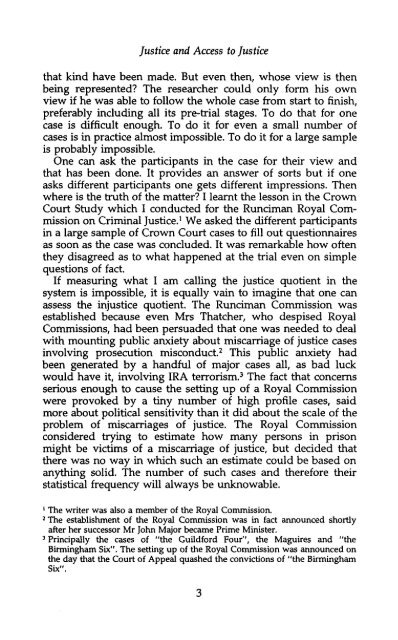HAMLYN - College of Social Sciences and International Studies ...
HAMLYN - College of Social Sciences and International Studies ...
HAMLYN - College of Social Sciences and International Studies ...
Create successful ePaper yourself
Turn your PDF publications into a flip-book with our unique Google optimized e-Paper software.
Justice <strong>and</strong> Access to Justice<br />
that kind have been made. But even then, whose view is then<br />
being represented? The researcher could only form his own<br />
view if he was able to follow the whole case from start to finish,<br />
preferably including all its pre-trial stages. To do that for one<br />
case is difficult enough. To do it for even a small number <strong>of</strong><br />
cases is in practice almost impossible. To do it for a large sample<br />
is probably impossible.<br />
One can ask the participants in the case for their view <strong>and</strong><br />
that has been done. It provides an answer <strong>of</strong> sorts but if one<br />
asks different participants one gets different impressions. Then<br />
where is the truth <strong>of</strong> the matter? I learnt the lesson in the Crown<br />
Court Study which I conducted for the Runciman Royal Commission<br />
on Criminal Justice. 1 We asked the different participants<br />
in a large sample <strong>of</strong> Crown Court cases to fill out questionnaires<br />
as soon as the case was concluded. It was remarkable how <strong>of</strong>ten<br />
they disagreed as to what happened at the trial even on simple<br />
questions <strong>of</strong> fact.<br />
If measuring what I am calling the justice quotient in the<br />
system is impossible, it is equally vain to imagine that one can<br />
assess the injustice quotient. The Runciman Commission was<br />
established because even Mrs Thatcher, who despised Royal<br />
Commissions, had been persuaded that one was needed to deal<br />
with mounting public anxiety about miscarriage <strong>of</strong> justice cases<br />
involving prosecution misconduct. 2 This public anxiety had<br />
been generated by a h<strong>and</strong>ful <strong>of</strong> major cases all, as bad luck<br />
would have it, involving IRA terrorism. 3 The fact that concerns<br />
serious enough to cause the setting up <strong>of</strong> a Royal Commission<br />
were provoked by a tiny number <strong>of</strong> high pr<strong>of</strong>ile cases, said<br />
more about political sensitivity than it did about the scale <strong>of</strong> the<br />
problem <strong>of</strong> miscarriages <strong>of</strong> justice. The Royal Commission<br />
considered trying to estimate how many persons in prison<br />
might be victims <strong>of</strong> a miscarriage <strong>of</strong> justice, but decided that<br />
there was no way in which such an estimate could be based on<br />
anything solid. The number <strong>of</strong> such cases <strong>and</strong> therefore their<br />
statistical frequency will always be unknowable.<br />
1 The writer was also a member <strong>of</strong> the Royal Commission.<br />
2 The establishment <strong>of</strong> the Royal Commission was in fact announced shortly<br />
after her successor Mr John Major became Prime Minister.<br />
3 Principally the cases <strong>of</strong> "the Guildford Four", the Maguires <strong>and</strong> "the<br />
Birmingham Six". The setting up <strong>of</strong> the Royal Commission was announced on<br />
the day that the Court <strong>of</strong> Appeal quashed the convictions <strong>of</strong> "the Birmingham<br />
Six".

















